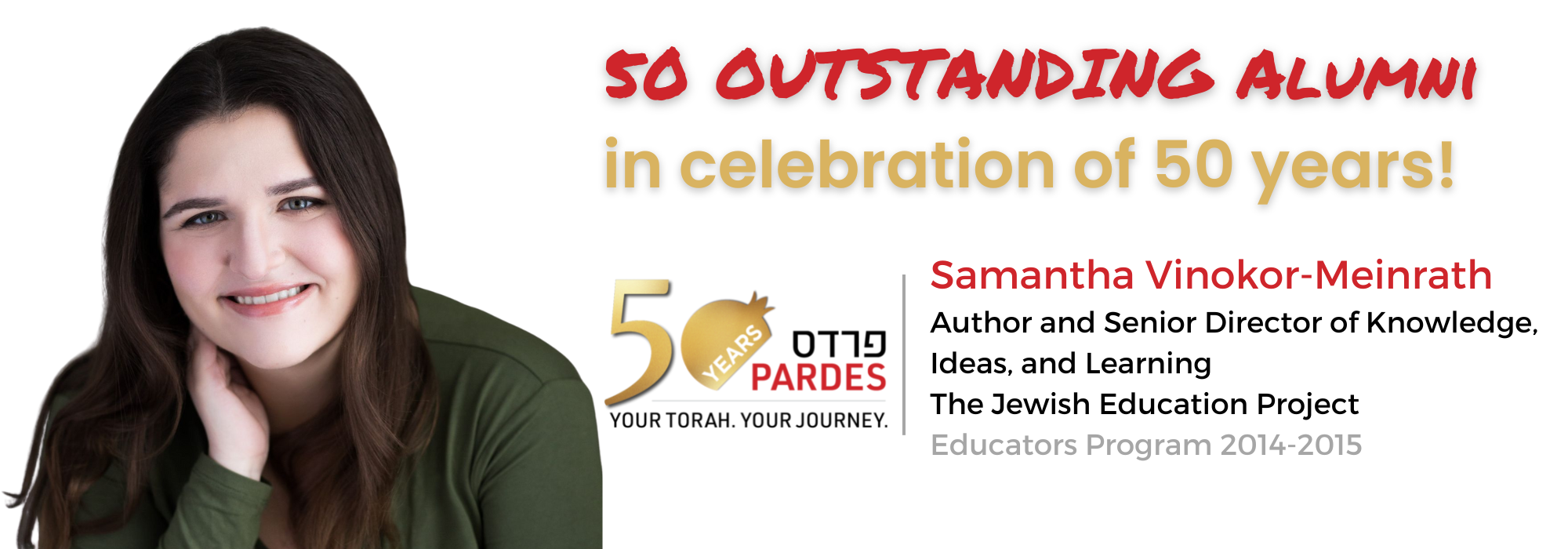
They are leading and creating organizations and businesses of all kinds, responding to humanitarian crises, writing novels, educating at all levels, creating works of art, and so much more! In celebration of Pardes’s 50th, we are highlighting 50 standout alumni whose accomplishments exemplify the rich texture of the Pardes community worldwide.
Samantha is the Senior Director of Knowledge, Ideas, and Learning at The Jewish Education Project, and recently published her first book, #antisemitism: Coming of Age During the Resurgence of Hate. Samantha works with Jewish educators and learners nationwide as they explore questions of Jewish identity, belonging, and choices.
WHAT’S YOUR FAVORITE SPOT IN JERUSALEM?
My favorite spot in Jerusalem is the Tachana Rishona, the restored First Station, and its walking path along the old train tracks. Jerusalem can be a city of extremes, where so many different people live without interacting in shared spaces, but that area feels like a microcosm of pluralism. You see people from across the spectrum of Judaism, as well as from all of the other faith traditions that call Jerusalem home, enjoying and co-creating the atmosphere together.
IF YOU COULD HAVE ANY SHABBAT GUEST, WHO WOULD IT BE?
I would love to invite over my late grandparents, Irving and Rita Kreinin. My grandpa died while I was growing up, and my grandma died a few months before I found out I was pregnant with my son. I’d love to have the chance to introduce them, and to let them kvell over the baby I know they would have so deeply loved. I would ask them to retell all the stories of their childhoods, to learn from them one more time.
WHAT DID YOU DO FOR THE FIRST TIME AT PARDES?
Pardes is the first place where I felt ownership over my ability to access Jewish texts. There are many things that I came into Pardes knowing from my study of secondary sources, or through my time spent in a variety of Jewish communal spaces and learning environments. Being given access to the breadth and depth of the Beit Midrash and being empowered to go seek out whatever sources or knowledge I was craving was unknown to me. I had read bits and pieces of certain texts, often without context, and Pardes gave me the chance to put everything together in a way that none of my previous learning experiences ever had.
WHAT IS YOUR FAVORITE PASUK, PASSAGE OR TEXT?
I loved learning and love teaching the story from the Talmud about Kamtza and Bar Kamtza. Their conflict is the trigger for what ultimately led to the destruction of the Temple and the start of Rabbinic Judaism. In Jewish education, we often talk about how relationships are at the core of everything we do. This text has so much to offer in terms of how we treat each other, what it means to be in community with others, and the impact that our actions have.
HOW DOES PARDES CONTINUE TO AFFECT YOU TODAY?
My time at Pardes was the first time in my life that I learned how to love things that didn’t come naturally to me. Growing up, I enjoyed taking the easy path – I was good at writing, so I loved English classes, whereas math didn’t come naturally to me, so I decided I didn’t like it. At Pardes, I experienced the joy of a challenge, of letting myself love something while struggling with it, and the pride of a true moment of clarity and understanding.
WHAT DOES THE JEWISH WORLD NEED MOST RIGHT NOW?
The Jewish world is in need of an infusion of proactive Jewish pride and Jewish joy. When I wrote my book, #antisemitism: Coming of Age During the Resurgence of Hate, one of the key takeaways was that many young Jews today are making their Jewish choices as a result of the external pressures of rising antisemitism, instead of based on their own desires and growth. I’m on a mission to inspire learners and communities to focus on Jewish joy, and what connects them with our amazing traditions, wisdom, culture, and identity, rather than allowing their Judaism to be shaped externally.